There are 100s of eCommerce platforms you can use to build an eCommerce website online.
They provide website builders and templates to get the store online fast.
Use them, and you make a sale or two in a day.
But if you want an eCommerce platform that helps lunch your eCommerce store, run it, and scale your growth…
You need more than an eCommerce website builder, you need the best eCommerce platform equipped with all the business tools to help you create a stunning eCommerce website and make more than a few sales and scale your business growth with no hustle.
In this post, we’ll compare the seven best eCommerce platforms based on features, ease of use, templates, website builders, theme designs, eCommerce automation, prices, scalability, payment gateways, and much more.
You will aslo learn the best eCommerce platforms for:
- Small businesses
- Best for SEO
- Big enterprises
- Beginners
- Dropshipping
- Brick to mortar
- And much more.
Let’s dive in.
Disclosure: Please note that some of the links in this article are affiliate links that I will earn a little commission from at no additional cost to you. This commission helps make this guide free of charge to you; however, the links are for the the best eCommerce platforms that I stand behind when building a successful eCommerce store online.
Top 7 Best eCommerce platforms.
Want to know the most significant mistakes startup entrepreneurs make?
Choosing the wrong eCommerce platform for the eCommerce business.
Without a business-designed eCommerce software, there is no growth, so you can’t scale your business.
They try to create an eCommerce website that doesn’t have the necessary features to make it a business; save yourself the trouble.
If you want to start an eCommerce store that attracts new customers and makes thousands of sales a month, choose an eCommerce platform that’s best for your business niche.
Here is my list of the best ecommerce platforms for your ecommerce store.
1. Bigcommerce
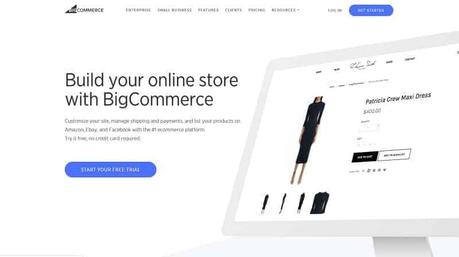
Bigcommerce is an open-source SaaS (Software as a Service) company founded in 2009. It’s best known for its robust product search engines that make it the perfect platform for enterprise brands with lots of products.
They have brands in the fortune 1000 like Ford, Toyota, Skullcandy, and many more under their wing.
They have essential SEO features, 24/7 support, over 40 payment gateways, advanced marketing options, inventory management tools, product options, and more to help you scale with your eCommerce business to more than $100 million a year.
If you’re a small business owner looking for an eCommerce platform with built-in functionalities and features, big commerce is a good choice for you.
Their user-friendly interfaces allow you to customize your shop, add products, and start selling without any knowledge of coding.
The interface also contains sections for order and tax management, marketing, analytics, etc. It’s aimed for both people with and without any web development skills.
Bigcommerce launched the Bigcommerce for WordPress in 2018, a plugin that allows WordPress users to manage their WordPress content sites and their eCommerce stores with Bigcommerce.
Bigcommerce is a paid platform with 2 product plans:
- Bigcommerce
- Bigcommerce essentials
Any of their plans offer a fully branded online store, free domain name, and a free SSL certificate, both plans are built to help you scale your growth.
Their starter plan offers 7 free themes, and the sales limit depends upon your current plan, which is few compared to other eCommerce platforms like WooCommerce that provide hundreds of free themes and unlimited product sales.
Pros
- Bigcommerce is highly scalable
- Amazing theme designs
- Abandoned cart features
- Best SEO features.
- 24/7 support.
- Zero transaction fees.
- Advanced product options.
- Integrations to sell on Amazon, eBay, and social media platforms like Facebook, Instagram, and Pinterest.
- Highly Responsive themes.
Cons.
- No 1-click selling and upselling.
- No abandoned cart features for their starter plan.
- Big stores with many products need to upgrade to their enterprise plan, which is expensive.
- High learning curve compared to a platform like Wix.
2. Wix
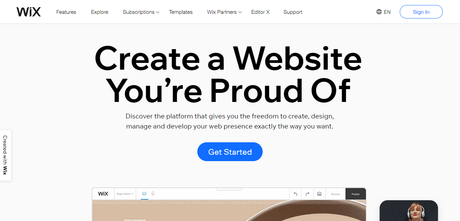
Wix is a website builder that offers eCommerce functionalities for users who upgrade to their eCommerce plan for $20 a month.
It is one of the top eCommerce platforms that deliver the best value to startups and small businesses.
Wix’s eCommerce functionality offers designer-made templates, product galleries that automatically optimize your store for mobile devices and tablets.
It’s the best tool as a website builder and an eCommerce space that requires no coding knowledge.
The platform also offers easy order management, a shipping panel, secure checkout, 24/27 support, coupons and discount codes to help you sell more.
The eCommerce software is equipped with a drag and drop store builder feature to help you create your dream store with over 500 themes; 72 of those are free.
Wix’s drawback is an extra-string to the blog post URLs that are not ideal for SEO and limited storage space of 20 GB.
Away from that, their on-page customer support makes it the top user-friendly eCommerce platform for small businesses.
Pros
- Free themes
- Easy to set up.
- Best support
- Multiple language stores
- Currency convertor
Cons
- Poor SEO features.
- Lacks automation
- No upselling feature
3. Shopify.
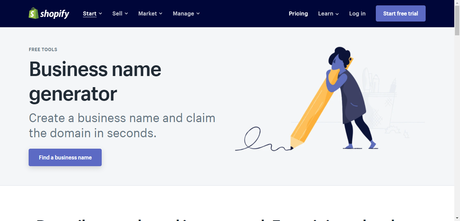
Shopify is the fastest-growing SaaS platform that hosts over 400,000 merchants.
If your business plan is to use marketing features like Facebook ads and Instagram marketing, Shopify is the best eCommerce platform for you.
I do not recommend using Shopify if you plan to rely on SEO because its SEO features are highly lacking; for SEO, I recommend a platform like Bigcommerce.
It’s also not the best choice for large enterprises with many products; it’s perfect for dropshipping small and medium stores.
Their drag and drop interface make it perfect for beginners who don’t have any coding or web development experience to create their first store.
The Shopify POS makes it easy for a brick-and-mortar store to take payment online.
One of their most concerning downsides is their SEO feature that makes it hard to rank on search engines and a transaction fee if you’re not using the Shopify payment option.
Away from those downsides, all their plans offer notable features like discount codes, inventory management, support in multiple languages, buy buttons, marketing features, abandoned cart recovery, unlimited products, and more.
Pros
- User friendly and easy to set up
- Fast page speed
- 1-click selling/upselling
- Multi-channel selling on platforms like Amazon, eBay, Walmart Marketplace, and Instagram.
- Great themes
- Email marketing features
Cons
- Too many paid apps that increase the cost of running an online store
- Advanced features require a developer
- You cannot optimize the checkout process
- 100 product variants limitation
- Poor URL structure (campingsite.com/collections/tents) is ideal for search rankings
4. Weebly

With over 40 million customers, Weebly is the best option if you want to start a simple online store with a built-in marketing automation feature at just $38. However, I don’t recommend it if you’re planning to rely on SEO.
It’s also an excellent choice for startup entrepreneurs who don’t have the big budgets to hire a developer compared to eCommerce platforms like Magento and WooCommerce.
All 3 Weebly plans support eCommerce. The business and performance plan are the best options for an eCommerce business because the starter plan lacks a feature for eCommerce.
The eCommerce platform is limited to physical goods with a transactional fee of 3%, limiting businesses that sell digital products.
Weebly is a very easy-to-use platform with drag and drop tools, HTML, and CSS to help you customize your template best.
Many free and paid themes cost around $45, but not all are responsive or mobile-friendly, so choose carefully.
The best feature I love about Weebly is their mobile app that you can use to manage your business. The platform is easy to use with a simple dashboard, and you can upload products in bulk.
Pros
- Low-cost eCommerce marketing automation
- Lots of free designs
- Easy to use dashboard
- Best value overall
- Mobile app
Cons.
- SEO sucks.
- Basic inventory management.
- Extra transaction fee.
5. WooCommerce.
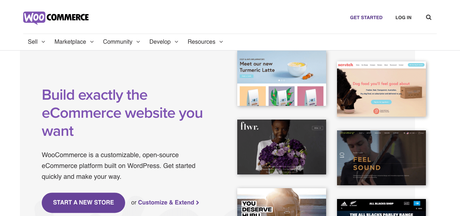
WooCommerce is a plugin for WordPress that turns any WordPress site into an eCommerce store. It’s one of the most popular eCommerce solutions today that covers 25% of all stores online.
The plugin has extensions that integrate social media, payment gateways, shipping, 1-click selling, email marketing, and more.
The best news about the WooCommerce plugin is that it’s free of charge though some extensions are paid.
The drawback to WooCommerce is slowing down the site as products and customers increase.
Depending on your store needs, you can use a free or paid WordPress theme capable of WooCommerce.
If you’re already running a WordPress site, you need to install the plugin, fix the site setting, add your products, and start selling.
WordPress is a free blogging platform, but you still need to buy Webhosting from hosting providers like Bluehost, Install WordPress, set up a theme and plugins, which make a struggle if you don’t have the technical details.
Pros
- Best for SEO as WordPress is the best platform for SEO.
- Many integrations are available to add to your site.
- Highly customizable.
- 1-click selling extensions
- It’s easy to get technical support from many WordPress experts
Cons
- You need an excellent Webhosting service like Bluehost, which costs $2.95/month
- No support except WordPress communities
- You need lots of extensions for features like payment gateways, marketing automation, and more.
6. Squarespace

Squarespace is a drag and drop website builder and eCommerce platform founded in 2003.
It’s an excellent option for print-on-demand eCommerce businesses that offer sleek templates and designs.
To start selling on Squarespace, you need the business website plan at $18/month if you pay annually.
The downside to this plan is you must pay a 3% transaction fee. To escape this transaction fee, you need to upgrade to the eCommerce plan at $26 and $40/month. With the eCommerce plan, you get access to good marketing features, SEO, analytics, social media, and inventory management.
Their drag and drop editor needs getting used to, so you must play with it a couple of times.
Squarespace integrates with Shipstation; you can install Printul and ShipBob from their app section instantly.
You also get real-time calculations of shipping rates from major providers like UPS and FEDEX.
The drawback is the eCommerce platform only supports Strip and PayPal as their payment processors.
Pros
- Stunning store designs.
- Great SEO tools.
- Integration with Shipstation and ShipBob.
- Set up is easy for a simple store.
Cons
- It has limited features and functionalities.
- No drop shipping.
- No selling on Amazon.
- There’s no marketing automation integration.
7. Magento
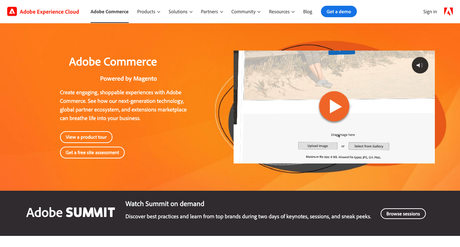
Magento is a cloud-based free eCommerce platform with a paid plan for large eCommerce businesses. Big brands like Nike Gamble trust it.
The platform is a solid choice to start an eCommerce store if you want something powerful.
Magento requires coding knowledge, so it’s an excellent choice if you have a developer or have a big budget to hire one. It also has many developers who can answer any questions you have for free and work on your store for a fee.
For the store design part, there is a marketplace to buy extensions and themes to increase the functionality of the eCommerce website.
The paid plan is charged annually, which makes it very expensive. Still, it comes with a list of great features like automated email marketing campaigns, automatic cross/upsell, and it’s speedy since it’s a cloud-based platform.
More features you can extend include discounts, recurring payments, membership subscription, grind SEO, unlimited products on whichever paid package you choose.
Pros.
- Big community of users and developers
- Rich features
- Strong SEO
- Highly customizable
- Highly scalable
- 1-click selling.
Cons
- Expensive themes
- Requires coding skills
- No support whatsoever
- Slow down
Ecommerce platforms FAQs
The number of global estimated digital buyers is expected to 2.14 Billion customers by the end of 2021. That accounts for about 27.2% of the world population.
People shop online because they want free delivery, discounts, coupon codes, quick checkouts, and reading reviews.
Despite all these stats, entrepreneurs who want to start their own eCommerce business find it challenging to choose the best eCommerce platform that best suits their business needs with over 439 options.
Here are some FAQs about the best eCommerce platforms for your business.
What are the best eCommerce platforms for SEO?
SEO is an important aspect when choosing eCommerce platforms for your business today.
And since 93% of all internet activities start with searching keywords on search engines like Google and Bing, you want to choose a platform that provides built-in SEO features.
Ranking high in these search engines involves many factors like link structure, page titles, meta tags, page speed, Ux design, etc.
If your business plan is to rely on SEO, you need more than SEO basics from an eCommerce platform; you need a platform that offers various features to avoid limitations or paying extra in the future.
My recommendations:
- Bigcommerce
- WooCommerce
- Magneto
What eCommerce platforms for dropshipping business?
Starting a successful dropshipping business needs you to get all the technical hurdles right.
You need an e-commerce solution that is easy to use, provides 24/7 support, access to dropshipping plugins and extensions, stock management, and much more.
It should provide all the elements that to help you grow your business and improve customer experience.
My recommendations:
- Shopify
- Bigcommerce
What are the Best eCommerce platforms for Brick and mortar?
So, you’re a brick-and-mortar store owner looking to add a few eCommerce functionalities to your business website, accepting payment online, to be specific.
You don’t need to spend a lot of money on this specific feature. A simple eCommerce solution like Wix can do the task. If your business is already running a business website on WordPress, then the Bigcommerce for WordPress plugin is an accessible choice.
My recommendations:
- Bigcommerce for WordPress
- Wix
- Shopify
What are the best eCommerce platforms for enterprises and big brands?
Large eCommerce businesses usually need a complete eCommerce solution because…
Let’s face it.
They want full control of their warehouse management, inventory systems, integrate apps and software, and reduce errors.
Simple eCommerce platforms like Wix are out of their options.
My recommendations:
- Bigcommerce
- Magento
What are the best eCommerce platforms for beginners?
As a startup entrepreneur, you may want to build and run your online store on a limited budget. What you need is an eCommerce solution that is easy to use, so you don’t have to call a web developer for every minor technicality. Platforms like Magneto are not for you.
My recommendations:
- Bigcommerce
- WooCommerce
- Shopify
What are the best eCommerce platforms for small businesses?
Small businesses don’t usually have big budgets as big brands do, so pricing plans are essential.
But, in the long term, they need features to scale their growth as sales start picking up. They also want to expand to begin selling on platforms like Amazon, eBay, and social media platforms like Facebook and Instagram.
My recommendations:
- Bigcommerce
- Wix
- WooCommerce
Final thought:
While all eCommerce platforms are built to help you lunch, run and grow your eCommerce business, not all are best for your type of business.
All offer a slightly different set of features, and the best solution for you depends upon your type of business, skill set, nature of products, and budget.
Last Updated on May 7, 2021 by Isaac Ss
